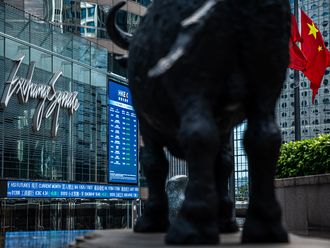Two critical developments have occurred this past week in the world of political economy. While both are far removed from each other, we suspect both will dramatically alter asset prices in the coming months.
The first, and much publicised, is the "bailout" of Greece by the European nations to the tune of 30 billion euros (Dh152 billion). The second, and little remarked upon, are the continued measures to tighten property prices in China. The former is a play to raise expectations in the global markets on values of Greek debt; the latter is an effort to stymie expectations on the Chinese asset price bubble.
From afar the two seem unrelated; but in essence both rely on influencing the global levels of liquidity. Yet, this effort by Brussels and Beijing relies on their ability to project credibility. Credibility of policy that seeks to influence perceptions on liquidity; liquidity, which in-turn, affects asset price stability. However, if history is any guide, governments that seek to buy economic stability by projecting inadequate levels of credibility have only worsened public welfare.
Focus
The Greek debt crises is about its ability to credibly borrow in the global markets to refinance its existing portfolio of debt. For the time being, the 16 euro zone countries have agreed to lend Greece around 30 billion euros at a fixed financing rate of 5 per cent and a variable rate of 4 per cent. This is in contrast to the nearly 7 per cent that global markets demanded last week. To its credit, the euro zone lenders who at first insisted that Greece must pay market rates, seem to have paid heed to the cautionary words that many including George Soros and Nouriel Roubini had advised.
To some farcical effect, the Greek authorities have repeated the mantra that they seek to still borrow from the markets, rather than rely on the package offered. Presumably, they are betting on the markets reading the presence of package as some sort of stop-loss guarantee.
The political viability of restructuring Greek finances is highly suspect. It involves substantive cost cutting measures including to public services and the prospect of increased revenue from an export driven growth. In such an environment, the credibility of the euro zone to promise further lending packages is what matters as far as currency speculators are concerned.
Finely calibrated messages need to be orchestrated concurrently from Berlin, Paris, Brussels and Athens. And, precisely on this issue of continued financial support is where the electorates of France and Germany might balk. In face of such political constraints, the question remains what exact effect will added liquidity (without long-term commitment) of this package will do to the prospects of the euro.
And in the far-off country of China the story remains the exact opposite and peculiar! The Chinese authorities have raised the cost of mortgages. First time homeowners have lesser discounts, the second time homeowners have no discounts with increased down-payments and the third time house owners have rates that banks are allowed to set. Yet, despite collapsing sales housing prices haven't crumbled. Perverse incentives are at play. Over the past few years the real estate industry in China had raised enough capital through massive sales that happened during the credit crises, courtesy stimulus packages doled out by Beijing.
Quashing the bubble
The real estate industry believes that the powers-that-be in Beijing can't really squish the real estate bubble since local authorities have been resettling people, increasing aggregate demand and buying stability through real-estate tax revenues. So, to effectively cripple a real estate boom means to effectively foster domestic unrest. The real estate developers have effectively dared Beijing to blink first. Till then, the cycle of loose credit, increased prices and greater asset inequality persists.
For decades since 1971, when the dollar convertibility into gold was abandoned, governments have overestimated their ability to seem credible. One shouldn't be surprised, in days ahead, if markets demonstrate its scepticism yet again.
History may not repeat, but it sure does rhyme the same.
The columnist works for a major European investment bank in New York City. You can follow his tweets at: http://twitter.com/ks1729












